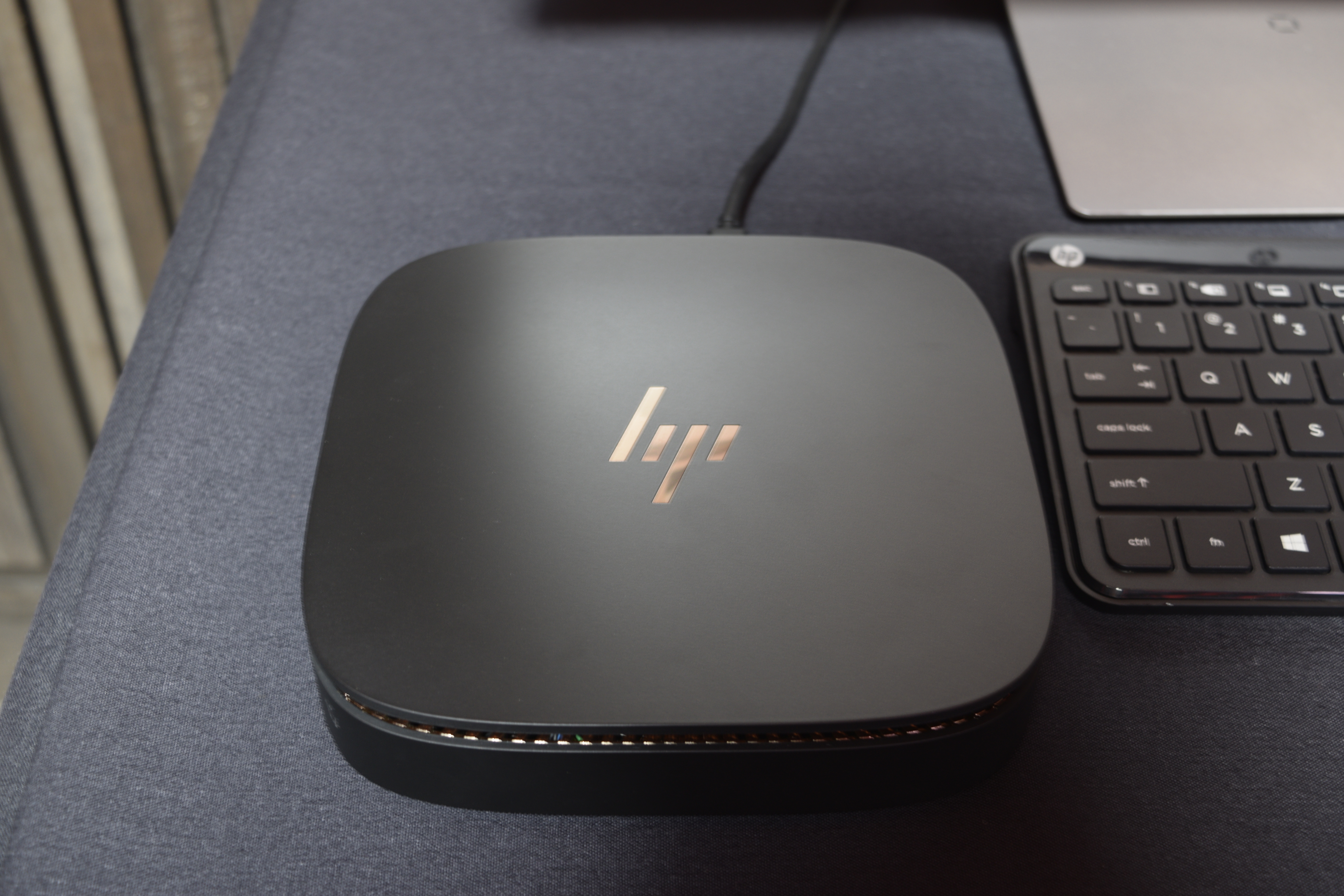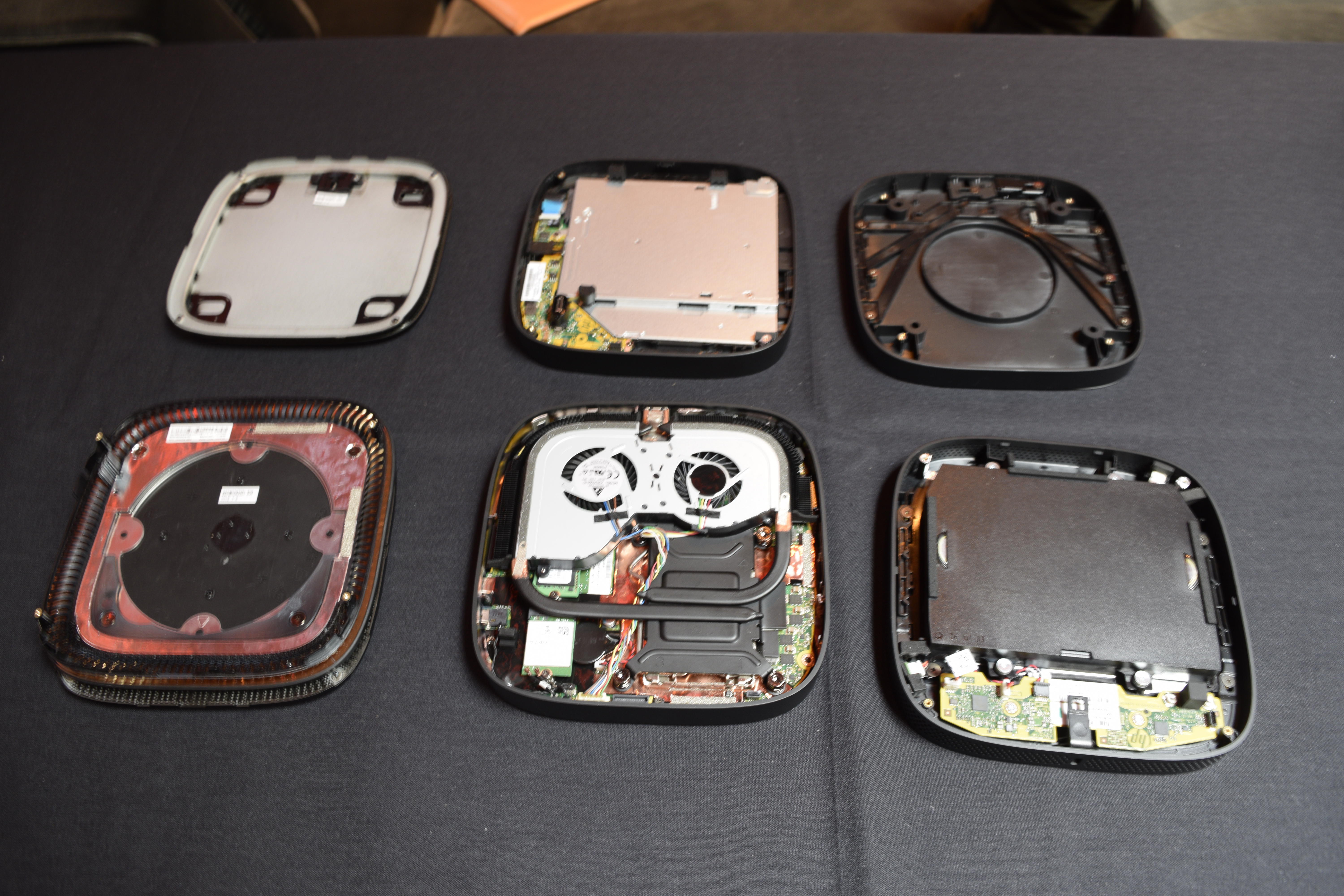HP Looking For ‘Slice’ Of The Modular Market With New Elite-Branded SFF PC
Modularity is a concept that, taken too far, borders on the ridiculous. But the number of companies seriously investing in the idea (with GPU docks, detachable keyboards, swappable components) has increased dramatically over the last year. Lenovo gave both its Thinkpad X1 tablet and its Motorola-branded Moto Z smartphone modular accessories, and Asus went so far as to create a functional modular motherboard, although it’s only a concept piece for the time being.
HP's also in on the action with the HP Elite Slice, a SFF modular PC that gains features with “slices” that you can add on. It’s designed as a commercial desktop deployment for small- or medium-sized businesses, to enhance communication and collaboration. But the modularity, small footprint, and performance still makes it a compelling home office or light productivity device.
Start With A Base
The HP Elite Slice, by itself, is the smallest PC in HP’s Elite lineup, measuring in at 6.5 x 6.5 x 1.38 inches and weighing only 2.31 lbs. The device can be equipped with up to a 6th Generation (Skylake) Intel Core i7-6700T processor (35W TDP), up to 32 GB of DDR4-2133, and up to a 512 GB HP Turbo Drive G2 SSD (M.2 NVMe).
The device features two USB 3.1 Type-C ports (one for charging) and two USB 3.1 Type-A ports, in addition to a DisplayPort and HDMI output. Internet connectivity can be achieved with an integrated Intel i219LM gigabit Ethernet port, or wirelessly with an 802.11ac Wifi module. It even has a tiny 2W speaker onboard.
Add A Slice Of This, A Slice Of That
All of the different Slice modules connect using a proprietary connector with USB Type-C data rates. Each module is about the same dimensions as the main PC component, and stack underneath the main unit. The device is not hot-swappable, so you have to power down the device to add or remove a module.
The top can come as just a plain plastic cover, but HP even made the Slice’s cover interchangeable. The Collaboration Cover (available at launch) is a teleconferencing module that turns the Slice into a Skype or business phone with easy call management and capacitive touch keys. There’s also a Wireless Charging Cover coming later next year that does exactly what you’d think: it charges a device wirelessly by placing it on top.
The HP Audio Module features a dual-array microphone and audio tuned by Bang & Olufsen, making it the ideal companion module for the Slice for Meeting Rooms (with Collaboration Cover). It’s not going to blast Pandora while you work, but it’s sufficient for teleconferencing with its noise-cancellation software.
Get Tom's Hardware's best news and in-depth reviews, straight to your inbox.
The other remaining modules are a DVD-ROM (HP ODD) and a VESA mount, which you may or may not need depending on your intended use. But that’s why the Slice is modular; you can take what you need and leave out what you don’t.
Pricing And Availability
The new HP Slice will be available this month from the company’s website starting at $699. The Slice for Meeting Rooms is also available in September starting at $949. The HP Audio Module is priced at $109, and the ODD Module is available for $99. The VESA mount goes for $39 and the Collaboration Cover is expected to ring up for $34. Pricing for the Wireless Charging Cover is currently unknown, and it will arrive sometime early next year.
| Product | HP Elite Slice |
|---|---|
| Processor Options | - Intel Core i7-6700T- Intel Core i5-6600T- Intel Core i5-6500T- Intel Core i3-6300T- Intel Core i3-6100T |
| Graphics | Intel HD Graphics 530 |
| Memory | Up to 32 GB DDR4-2133 |
| Storage | - Up to 512 GB HP Turbo Drive G2 (M.2, NVMe)- Up to 512 GB SSD (SATA)- Up to 500 GB SSHD (5,400 RPM)- Up to 500 GB HDD (7,200 RPM) |
| Ports | -USB 3.1 Type-C (Gen 1) x2- USB 3.1 Type-A (Gen 1) x2- Audio Out/Mic In- HP Slice Connector (For Modules) |
| Display Output | - HDMI- DisplayPort |
| Networking | - Intel i219LM Gigabit Ethernet- Up to Intel 8260 802.11ac Dual-Band WiFi |
| Dimensions (L x W x H) | 6.5 x 6.5 x 1.38 inches |
| Weight | 2.31 lbs. |
| Starting MSRP | $699 |
Derek Forrest was a contributing freelance writer for Tom's Hardware. He covered hardware news and reviews, focusing on gaming desktops and laptops.
-
bit_user The problems I see with these custom, modular efforts are inflated prices and limited selection. If I use anything smaller than mini-ITX, it'll be something I have no intention of expanding (beyond what I can add via USB).Reply -
Brian_R170 Assuming the dimensions are for the base unit without any of the accessories, it's not really that much smaller than mini-iTX. Still, it does look like it would be a good tool for managing audio/video/presentation communication in a conference room. My company currently uses some significantly larger HP Elite desktop SFF PCs that are tucked behind the monitors for managing remote presentations plus Cisco teleconferencing systems in the same room. Both could be replaced with one of these.Reply -
80-watt Hamster Reply18529574 said:The problems I see with these custom, modular efforts are inflated prices and limited selection. If I use anything smaller than mini-ITX, it'll be something I have no intention of expanding (beyond what I can add via USB).
Yeah, it doesn't seem like an optimal solution for an individual user. I can, however, see something like this being beneficial in a corporate environment. All your deployments could be more or less identical, with each instance getting the additional functionality required with a simple plug-and-play module or two. The increased cost could be offset long term by ease of maintenance and configuration. -
antilycus This has little appeal to me. I would rather use an AMD APU for better graphics (nothing crazy). My AMD A10 runs in 1080 w/ pretty good settings and I don't have to rely on intel's 700mb display driver and then laugh at Intel's crappy graphics performance. All you Intel followers (just as bad as Apple followers) are going to ruin the PC industry by following the leader, right off a cliff.Reply


